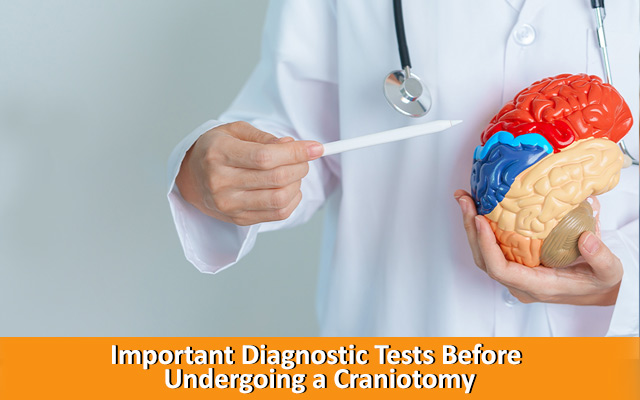A craniotomy procedure is often necessary for treating conditions like brain tumours, injuries, or severe neurological issues. Before you undergo a craniotomy, several diagnostic tests are crucial to ensure that the surgery is as safe and effective as possible. Before understanding craniotomy benefits, here is a rundown of the key tests that are conducted before this complex procedure.
- Imaging Studies
- MRI (Magnetic Resonance Imaging): MRI scans are essential for providing detailed pictures of the brain’s internal structures. They help doctors see exactly where a problem, like a tumor or injury, is located. This detailed imaging is vital for planning the surgery and making sure the surgical team has a clear understanding of your condition.
- CT Scan (Computed Tomography): A CT scan offers a quicker way to get an image of the brain and is often used in emergencies. It can show bleeding or swelling, which is useful for immediate assessments and planning.
- PET Scan (Positron Emission Tomography): PET scans can show how active certain areas of the brain are. This is especially helpful for distinguishing between different types of brain tumours and understanding their nature.
- Neuropsychological Testing
These tests evaluate cognitive functions such as memory, attention, and language. They help check how a brain condition might be affecting mental capabilities and provide a baseline for assessing recovery after the surgery. Neuropsychological testing is important for understanding potential impacts on daily functioning and planning the surgical approach.
- EEG (Electroencephalogram)
An EEG measures the electrical activity in the brain and is particularly useful if you have been experiencing seizures or other neurological symptoms. It helps pinpoint areas of abnormal activity that might need special attention during the procedure so that the patient can gain maximum craniotomy benefits.
- Blood Tests
Blood tests check your general health and identify any conditions that could impact the surgery, such as anaemia or clotting disorders. These tests are essential for ensuring you are in good condition for surgery.
- Functional MRI (fMRI) and Brain Mapping
If the surgery involves areas of the brain responsible for critical functions like speech or movement, functional MRI or brain mapping might be used. These techniques help locate and avoid damaging these crucial areas, ensuring that the surgery does not impair essential brain functions.
Conclusion
Preparing for a craniotomy involves several important diagnostic tests to ensure the procedure is safe and effective. These tests help doctors make well-informed decisions and reduce risks, ultimately aiming for the best possible outcome and helping you gain post craniotomy benefits.

